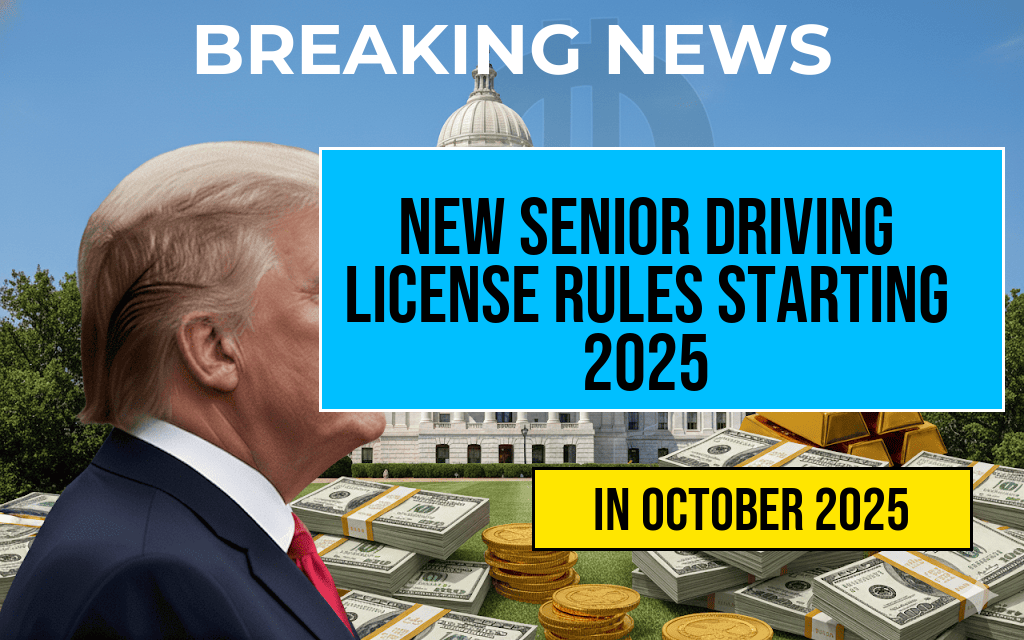Starting in October 2025, new regulations regarding driver’s licenses for seniors aged 70 and above will be implemented nationwide, aiming to enhance road safety while accommodating the needs of an aging population. The initiative, which has garnered attention from various advocacy groups and safety organizations, seeks to balance the independence of older adults with the potential risks associated with age-related health issues. Under the new regulations, seniors will be required to undergo more frequent vision tests, cognitive assessments, and driving evaluations to maintain their driving privileges. This measure has sparked discussions about its impacts on mobility, public safety, and the overall quality of life for older Americans.
Details of the New Regulations
The new regulations, enacted by the Department of Motor Vehicles (DMV) in collaboration with state governments, will introduce several key changes:
- Vision Tests: Seniors will need to pass vision tests every two years, compared to the current standard of tests every four years.
- Cognitive Assessments: A new requirement will mandate cognitive evaluations every four years to assess the mental acuity necessary for safe driving.
- Driving Evaluations: Seniors may also be required to complete behind-the-wheel driving assessments if they fail to meet certain criteria in their vision or cognitive tests.
Rationale Behind the Changes
The decision to implement these regulations is grounded in statistics indicating that older drivers are more susceptible to accidents due to declining physical and mental abilities. According to the National Highway Traffic Safety Administration (NHTSA), drivers aged 70 and above are involved in a disproportionate number of traffic incidents compared to younger age groups. The new measures aim to mitigate this trend while ensuring that seniors retain their independence.
Reactions from Advocacy Groups
Responses to the new regulations have been mixed. Advocacy groups representing seniors have expressed concern that these changes may unfairly restrict access to driving, particularly for individuals who have maintained their driving skills. AARP, a prominent organization for older Americans, has called for a balanced approach that considers both safety and mobility. They emphasize the importance of providing alternatives for transportation to ensure that seniors can remain active members of their communities.
Conversely, organizations focused on road safety have praised the measures as a necessary step towards reducing accidents involving elderly drivers. The Insurance Institute for Highway Safety (IIHS) has noted that enhancing testing requirements could lead to safer road conditions for all drivers.
Implementation Timeline and Support
The DMV is expected to roll out the new regulations in phases leading up to the official start date in October 2025. This gradual implementation will allow for public education campaigns to inform seniors about the changes and provide resources to help them adapt. Local DMVs will offer workshops and informational sessions to guide seniors through the new processes.
Resources for Seniors
As the new regulations come into effect, several resources will be available to assist seniors:
- Driving Programs: Many communities are expected to offer driving refresher courses tailored for seniors.
- Transportation Alternatives: Local governments may enhance public transport options and ride-sharing services catering to older individuals.
- Health Assessments: Seniors are encouraged to consult healthcare providers for regular health checks that can help them stay fit for driving.
Conclusion
The upcoming regulations for seniors aged 70 and above signify a pivotal shift in how states address the challenges posed by an aging driver population. While the focus remains on safety, the balance between independence and regulation will be critical as these changes unfold. Stakeholders across the spectrum will need to collaborate to ensure that the transition is smooth and that the needs of older citizens are adequately met. For more information about the upcoming changes, seniors can visit the NHTSA website or their local DMV’s official page.
Frequently Asked Questions
What are the new driving license regulations for seniors aged 70 and above?
The new driving license regulations require seniors aged 70 and above to undergo mandatory vision tests and medical evaluations every three years to ensure their fitness to drive.
When do the new regulations take effect?
The new driving license regulations for seniors will take effect in October 2025.
Will there be any fees associated with the new medical evaluations?
Yes, seniors may be required to pay a fee for the medical evaluations and vision tests as part of the new regulations.
How will these regulations affect renewal processes for senior drivers?
Seniors will need to complete the required vision tests and medical evaluations to renew their driving licenses, which may add additional steps to the renewal process.
Are there any exceptions to the new driving license regulations for seniors?
Currently, there are no known exceptions to the new driving license regulations for seniors aged 70 and above; all drivers in this age group will be subject to the new requirements.

Leave a Reply